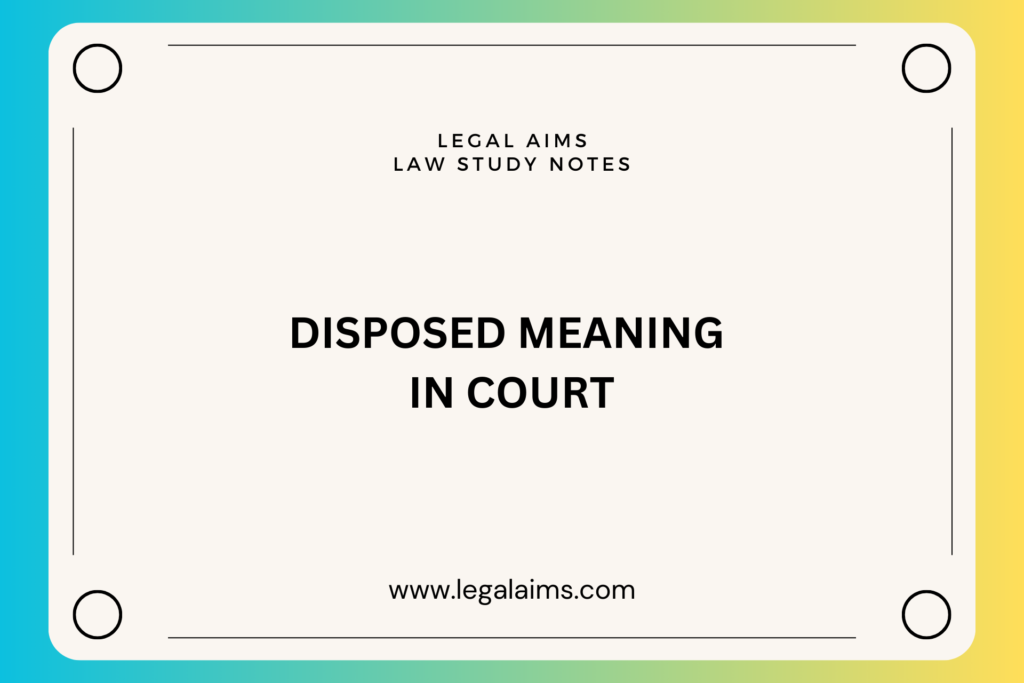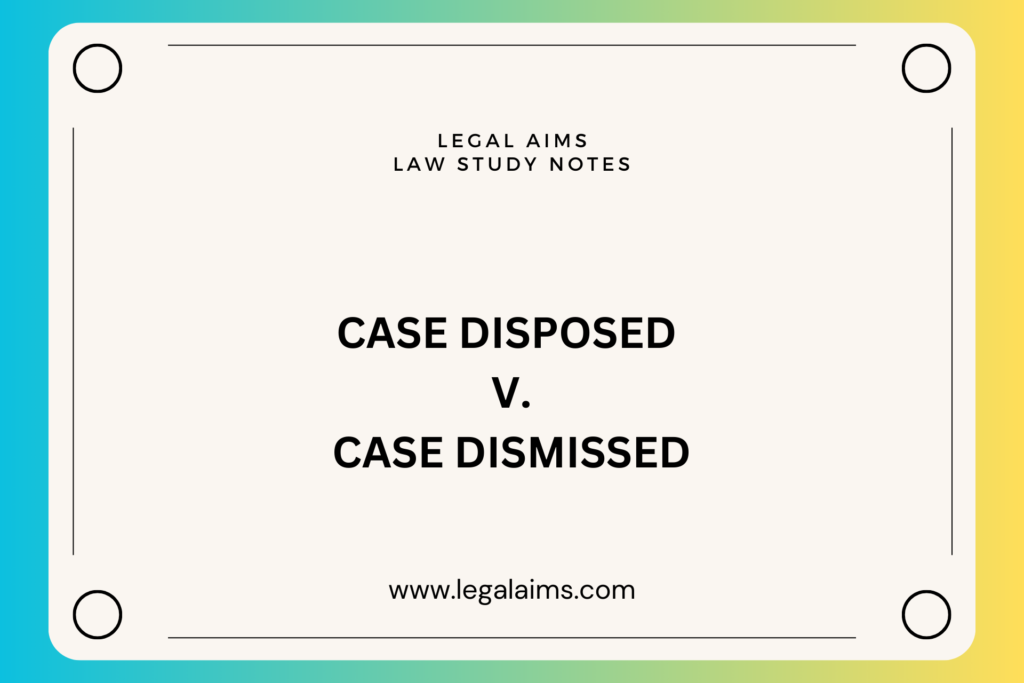disposed off meaning in court
Introduction
In the context of court proceedings, the term “case disposed” refers to the final outcome or resolution of a legal case.
It denotes the conclusion of a particular case, marking its closure and determining its final status.
It should not be confused with the term “case dismissed,” which implies the rejection or termination of a case without any further action or resolution.
When a case is disposed of, it means that the court has reached a decision or settled the matter in some way.
The nature of the case disposed can vary greatly, ranging from criminal to civil cases, including issues related to property disputes, divorce, or even public interest litigation.
The manner in which a case is disposed of depends on the specific circumstances and the relevant laws governing the particular case.
Under the Civil Procedure Code (CPC) and the Code of Criminal Procedure (CrPc), there are provisions that outline the time limits for the disposal of cases.
These time limits aim to ensure that cases are resolved in a timely manner, preventing undue delays and providing efficient justice delivery.
Failure to meet these time limits may result in consequences such as a stay on proceedings or even the dismissal of the case.
Read More: Voluntary And Involuntary Consumer
Definition of Disposed

In the legal context, the term “disposed” refers to the status or outcome of a court case. When a case is “disposed,” it indicates that it has been resolved, settled, or otherwise concluded.
This term is commonly used in legal proceedings to denote the final resolution or outcome of a case.
When a court case is disposed of, it means that all legal issues and arguments have been addressed, and a judgment, ruling, or decision has been made.
This can occur through various means, such as a guilty plea, a dismissal of charges, a plea bargain, or a trial verdict.
The use of the term “disposed” in court proceedings signifies that the case has reached its final stage and there are no further actions or hearings required.
It indicates that the matter has been settled in a legal sense, bringing the case to a close.
In summary, “disposed” in a legal context means the resolution, settlement, or conclusion of a court case.
It signifies that all legal matters and proceedings have been addressed, and the case has been finalized.
case disposed off meaning in court

Case disposal refers to the process through which a case is resolved or finalized in a court of law. It involves determining the outcome of a case, whether it be through a judgment, dismissal, or compromise. There are different ways in which a case can be disposed of.
In contested judgments, both parties present their arguments and evidence before the court, and the judge then decides the case based on the merits and the law. Uncontested cases, on the other hand, occur when one party fails to appear or defend their side of the case, leading to a judgment in favour of the other party.
Cases can also be disposed of through dismissals, where the court finds that the case lacks sufficient evidence or legal merit. Compromises, meanwhile, involve both parties reaching a mutual agreement to settle the case outside of court.
Various factors contribute to the disposal of a case. Lack of evidence, plea bargains, or settlement agreements are common reasons for case disposition. In some instances, the court may also dismiss a case due to procedural issues, such as a violation of the defendant’s rights.
मामले का निपटारा (disposed meaning in court in hindi)
मामले का निपटारा (Disposal of the case) भारतीय अदालतों में मामले का निपटारा करने की प्रक्रिया है। इस प्रोसेस में विचारधीन मामले के अदालती निर्णय का आयोजन किया जाता है।
मामले के निपटारे के कई चरण होते हैं। पहले, अदालत में चल रहे मामले की पेशी की जाती है और अदालत क्रमिक वितरण करती है। इसके बाद, न्यायाधीश आपातकालीन निर्देशानुसार मुद्दे का आंकलन करता है और केस के विभिन्न तत्वों का विचार करता है। यहां न्यायाधीश क्राईमिनल, सिविल या न्यायाधिश द्वारा जो निचला तालिका या उम्मीदवार की प्रतीक्षा सार्वजनिक की जा सकती है, को नजर अंदाज करता है।
एक मामले का निपटारा करते समय न्यायाधीश संबंधित कोड पर ध्यान देता है जिसमें केस दर्ज हुआ है। यह कोड न्यायिक इच्छाओं, कानूनी प्रावधानों और इलाहाबाद बाड़ी अदालत द्वारा ख़ाली रखे जाने वाले स्केज़ का मियार होता है।
अदालती दस्तावेज़ का महत्वपूर्ण योगदान होता है क्योंकि इसके माध्यम से न्यायधीश के निर्णय की पुष्टि की जाती है। इसके लिए कोर्ट दस्तावेज़ के आधार पर क्रिटेरिया, प्रोटोकॉल और कानूनी विवरण की जांच करती है।
मामले का निपटारा करना अदालत की प्राथमिकता है। इसका समयसीमा होता है और न्यायाधीश के क्रियान्वयन और अधिकार प्रबंध के परिप्रेक्ष्य में केवल स्थायी या उत्तरदायी निपटारा को संदेहपूर्वक तय किया जाता है।
Case disposed v case dismissed

In the context of legal proceedings, there is a subtle difference between a case being disposed of and a case being dismissed. When a case is disposed of, it means that the court has reached a judgment or determination on the merits of the case.
This can occur through various means, such as a guilty plea, plea bargain, or a trial resulting in either a conviction or acquittal. In a wider sense, case disposal refers to the final resolution of a case, regardless of the outcome.
On the other hand, a case is dismissed when it is terminated without a decision on the merits. This typically occurs due to procedural issues or deficiencies in the case. For instance, a case may be dismissed if it was improperly filed, lacks sufficient evidence, or essential witnesses are unavailable.
In some cases, a dismissal may occur because of an improper complaint or other technical reasons that prevent the court from making a determination on the substantive issues.
It is important to note that dismissal of a case does not necessarily imply that the claims made were unfounded or lacked substance. Instead, it signifies that the case could not proceed further due to procedural or technical obstacles.
Conversely, when a case is disposed of, it means that a judgment has been reached on the merits, whether in favour of the plaintiff or the defendant.
Conclusion
In court proceedings, the disposition of a case refers to the final resolution or outcome of the matter. It has significant implications for the parties involved, as it determines the legal consequences they face.
There are various outcomes that can result from a case being disposed of. Firstly, a case may be dismissed if it lacks sufficient evidence or if there are procedural errors. In such instances, the charges against the defendant are dropped, and they are not held liable for the alleged offence.
On the other hand, if the court finds the defendant guilty based on the evidence presented, a verdict is reached. This may lead to a range of consequences, such as fines, probation, or even imprisonment, depending on the nature of the offence.
In some situations, a case can also be disposed of with the possibility of reopening. This occurs when new evidence comes to light or if there were errors in the original proceedings. In such cases, the disposition is not considered final, and the matter can be revisited at a later stage.
Overall, the disposition of a case in court is of utmost importance as it determines the outcome for the parties involved and has significant implications for their legal standing. Whether a case is dismissed, results in a guilty verdict, or offers the potential for reopening, it is crucial to ensure that justice is served.

